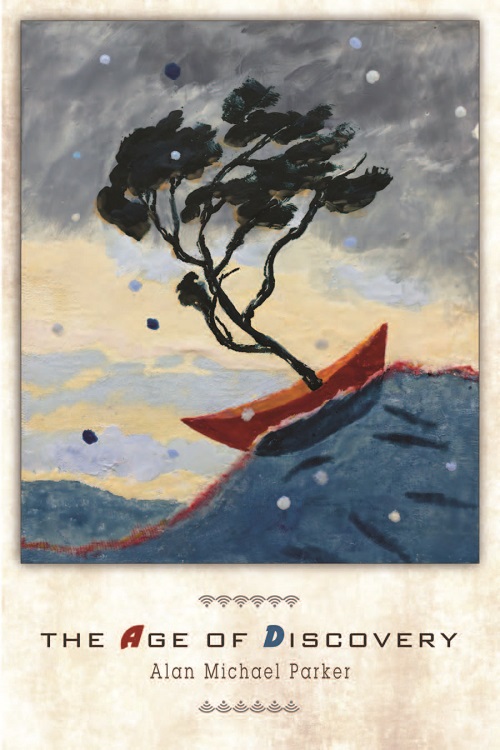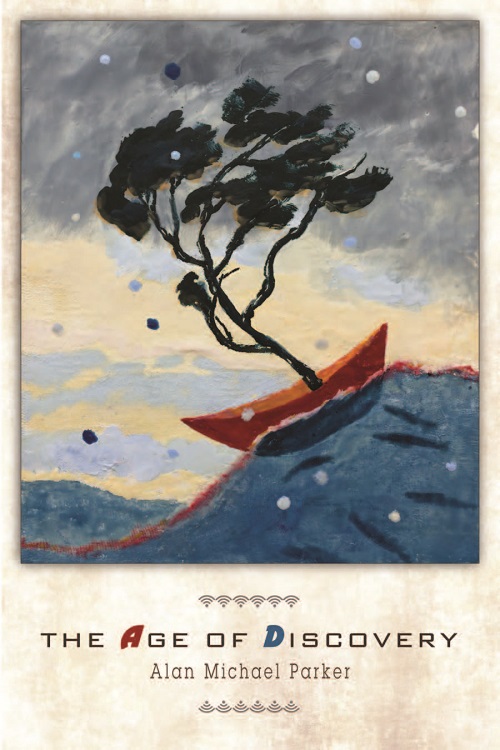
Pick up a biography, and one is drawn first to thumb through the sheaf of photographs lodged centrally in the book. With a volume of poetry, it’s the notes to the poems, should they exist. The Age of Discovery has notes for nineteen of its forty-five offerings. They are snapshots of Alan Michael Parker’s breadth of experience, touching on his reading, on music, and even on photographs. I prefer to peruse notes first, rather than after the fact. I want to go in knowing the poem’s context, genealogy, heredity. Topic is different from inspiration, and where a poem goes, given its topic, can be differentiated from what it is that has has tickled the poet to explore, via the vehicle of poetic composition. It isn’t fair, really, that we don’t get the earlier drafts. Poets get to revise in secret, tinkering in their laboratories in an elaborate series of do-overs we call editing. The final result can be a mélange of topic and inspiration, and the reader will never know the percentages involved, and that’s okay. Ultimately, it isn’t what clothes come out of the closet: it’s what you wear to the ball. Scrutiny will always discover vanity, which is my deliberate kick to the title of this book, wherein the poems offer the encounter between chosen quotidian moments and the sudden settling in of context.
As Parker writes, in “Top Hat and Tails,” “It’s the moment in a rented tux / when you catch sight of your vanity / in the beat-up Chevy’s side-view mirror …” And believe it or not this is a poem about getting a word wrong while you “aim / for the scrum of the evening gowns.” The poem actually spends much of its depth in a softball game, and what I mean to point out it this: The ablest of narrators—and Parker is such—will scoop us along with them, like the car in a coaster. We wouldn’t go along for the ride but that we trust the rails. In these poems it’s possible to sense the poet’s guiding hand, but it’s also easy—easier—to give in to something like suspension of disbelief. Really, a species of trust is involved.
There are times when my readerly suspicion starts a-buzzing, such as when a given poem contains a summative coda. In “We Are Like People Waiting,” the poem traverses an extended simile of “waiting for a table” that lasts for the first twenty of its twenty-three lines. The first two stanzas are ten lines apiece. The third stanza is the offering: “In this way our dreaming / and our waking selves / take turns.” It’s a well-wrought idea, this equating of the bifurcated mind (sleeping and awake) as each half awaiting it’s turn at the banquet of experience. All the more intriguing because of the assumption that the subconscious feeds on the sensory world from which it is necessarily abstracted. There are readers who want the poem to close with a click and not on a creaking open of a vast door. This does both.
There is plenty here for those who favors a poem that asks the reader to re-contextualize based on its ending. This is a kind of closure. The mechanism is a thematic mirror. Get to the ending and you are given a reflector, and it is not necessarily convex, which would open the reader’s focus to the wider world. A concave mirror kind-of-closure will act like a lens, pointing the reader back up the page. In “When I Am a Hummingbird,” Parker’s narrator considers of his two dogs who are cruelly killing a baby possum. The narrator loves the dogs even so, “because that’s Nature, right?” Just there, with the interrogative “right?” we are drawn in, brought closer by the appeal for our agreement. This narrator asks of the reader to be affirmed in the quaking bog of self-doubt. The rest of this, the third stanza out of nine, consists of two parenthetical lines: “(And whom did I just ask whether that was right?) / (And what’s a moral quandary for a possum?)” And the second half of the poem posits the terms of the title: “But when I am a hummingbird …” recounting the marvels of hummingbird physiology, “no one will stop me or catch me …”
and I will dive into the meat
of the possum
and beat there,
the mean, bloody thing alive again.
In terms of this volume, this is not a singular poem, although it is striking. The narrator, seeking support for his indulgence of the conscience-cost of “Nature,” inhabits the quick and darting phantasm of a bird that re-inhabits the dead as a heart that beats, like the poem, in payment, in compensation for the loss.
There are any number of strong poems early in this book. Taking nothing away from those unnamed, I salute “The Microeconomics of Love”; “The Stars”; “What Good is Life without Painting”; and “Maybe the Soul.” Later in the book, the longer poem “Neruda on Capri” (five pages in eight sections of three-line stanzas) is an ode to Neruda. At times the story eclipses the music of the poem, and one can feel Parker struggling with the effort to posit the importance of the story to the narrator. But at times the music breaks through: “All along, I have been writing about intimacy / but not naming how it terrifies me. / I make up objects, lives, // confections of euphonia …” And it is when such music reasserts that one can detect the other parts of the poem that remain in thrall to the tale. The closing three stanzas:
Neruda on Capri,
the bees in a hive behind
his borrowed house and bed,
each an Ode.
The bee in the poem, put there by me.
The man in the poem,
not the story but the man. Neruda, taken.
I take, and take, and want to own nothing:
Matilde Urrutia, be happy.
Now, I wish to admit both my admiration and my dissent. In this closing I would delete “put there by me” and consider closing with “… taken.” The work is solid, and the contextualizing of the narrator and narrative action takes me out of the poem precisely where I wish to be left to dwell.
There is far more to this volume than one can detail here. “In the Next Life, a Tree,” and “Partial Eclipse of the Self” are both edifying. The last line of the latter is especially poignant: “This happened driving through a moment, and I want it back.” Parker is marvelous when working, for lack of a better phrase, in the kitchen. The fine short poem “Egypt, North Carolina,” details exactly that, “For the wild, unhappy refrigerator, / ice an unsolicited opinion.” Then a few other common appliances, and, near the end, the narrator who will soon, like anyone, “… take out the trash, / ill-fated as any Pharaoh …” And I hear Dickinson crowing: “And I choose, just a Crown—”
The Age of Discovery, by Alan Michael Parker. North Adams, Massachusetts: Tupelo Press, October 2020. 78 pages. $18.95, paper.
David Epstein holds a PhD in English and American Literature. Currently teaching Creative Writing at the University of Hartford, he can often be found in Woods Hole, Massachusetts. Epstein is on the board of the Greater Hartford Friends and Enemies of Wallace Stevens. He has three children, and lives in West Hartford, Connecticut. He has reviewed for Harvard Review and Shofar; his poems have appeared in such venues as Bellingham Review, Marsh Hawk Review, RatsAss Review, and more.
Check out HFR’s book catalog, publicity list, submission manager, and buy merch from our Spring store. Follow us on Instagram and YouTube. Disclosure: HFR is an affiliate of Bookshop.org and we will earn a commission if you click through and make a purchase. Sales from Bookshop.org help support independent bookstores and small presses.


Leave a comment